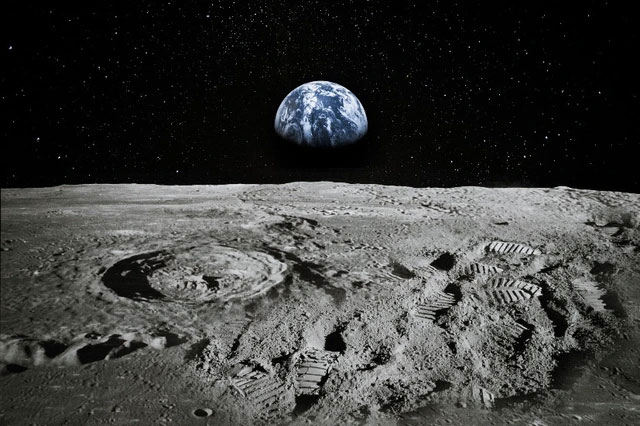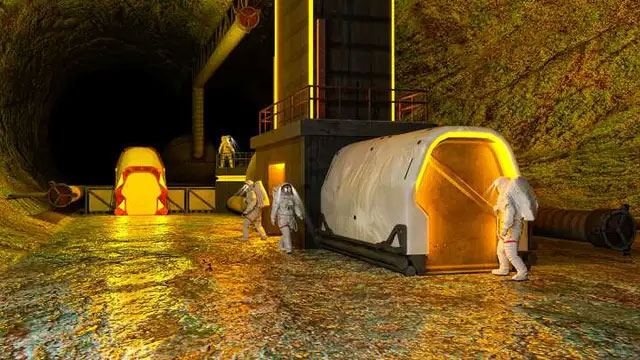Fearing catastrophic climate change, scientists want to store all mankind's knowledge on the Moon's volcano
Scientists are still trying to find ways to preserve the current achievements of mankind in order to deal with the risk of human extinction at any time.
A Doomsdat Vault has been built on the Norwegian island of Spitsberger, to store copies of seeds in sealed aluminum bags. This repository will protect the crops for the world food supply from being lost through disasters such as war or natural disaster.
But the system is far from perfect – this warehouse has been flooded by weather changes – but the idea behind it is being adopted by a company to protect human knowledge, rather than just seeds. This company called Lonestar is planning to store human data in volcanic lava tubes on the Moon.

We need to get our assets where we can keep them safe.
Christopher Stott, CEO of Lonestar said: "It is unthinkable that we are keeping our most valuable assets, our knowledge and our data, right on Earth, where we are still dropping bombs and We need to get our possessions off this planet, where we can keep them safe."
More than just a crazy idea, this past April, the company said it had contracted for the first two missions to put data centers on the Moon.
There is actually a similar Apocalypse repository for open source data, located in Svalbard.
Lonestar has booked a seat on the IM-1 mission of Intuitive Machines, a private company about to send a lander to the Moon to perform a software test of a small amount of data stored on board. landing. They then plan to "deliver the first full data service upload to Intuitive Machines' IM-2 to the lunar poles," where they perform upload and download tests.
Lonestar's idea is that future servers can communicate with Earth, as well as store information that we don't want to lose for years to come.

Storing data on the Moon has never been an easy task.
"If we don't, what will happen to our data on Earth?" Stott said. "The seed bank has been flooded by the effects of climate change. It is also susceptible to other forms of destruction like war or cyberattacks. We need somewhere where the data can be stored securely. safe."
This is not the first time scientists have proposed the idea of storing important Earth knowledge on the Moon. But storing data on the Moon has never been an easy task.
The temperature difference of the Moon is very large. During the day it can reach 106 degrees Celsius, but at night it can drop to -183 degrees Celsius and the surface of the Moon does not have the same layer of protection against solar radiation as the Earth's atmosphere. Therefore, Lonestar proposed building data servers in the craters of volcanic lava of the Moon, where the temperature is more stable as well as preventing radiation from destroying the server.
In addition to Lonestar, the Italian space agency has also authorized Thales Alenia Space to build data centers on the Moon as part of NASA's Artemis Moon program. This program will lead to permanent settlement on the Moon, so data centers are a requirement, not a whim.
- This is how Dubai copes with climate change
- Climate change is happening faster than expected
- What is Climate Change?
- Symbiogenics: Strategies to mitigate climate change impacts on rice
- Climate change from a scientific perspective
- Knowledge Vault - The system for storing all knowledge of mankind
- Marching for climate change around the world
- Climate change through the famous sunset picture
- The terrifying change of the Earth due to climate change
- Volcanoes can 'wake up' in 2012
- SimCLIM helps build climate change scenarios
- 4 shocking findings on climate change
 Van Allen's belt and evidence that the Apollo 11 mission to the Moon was myth
Van Allen's belt and evidence that the Apollo 11 mission to the Moon was myth The levels of civilization in the universe (Kardashev scale)
The levels of civilization in the universe (Kardashev scale) Today Mars, the sun and the Earth are aligned
Today Mars, the sun and the Earth are aligned The Amazon owner announced a secret plan to build a space base for thousands of people
The Amazon owner announced a secret plan to build a space base for thousands of people